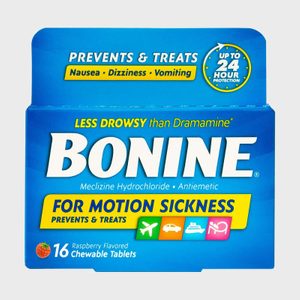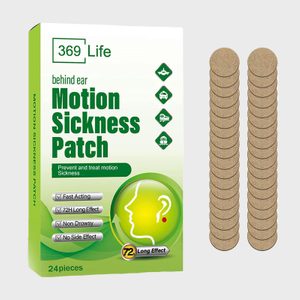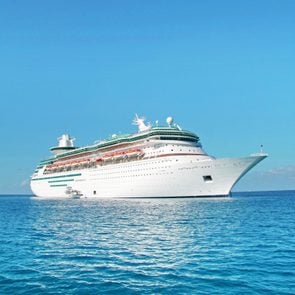What Happens If You Get Sick on a Cruise Ship?
Updated: Mar. 28, 2024
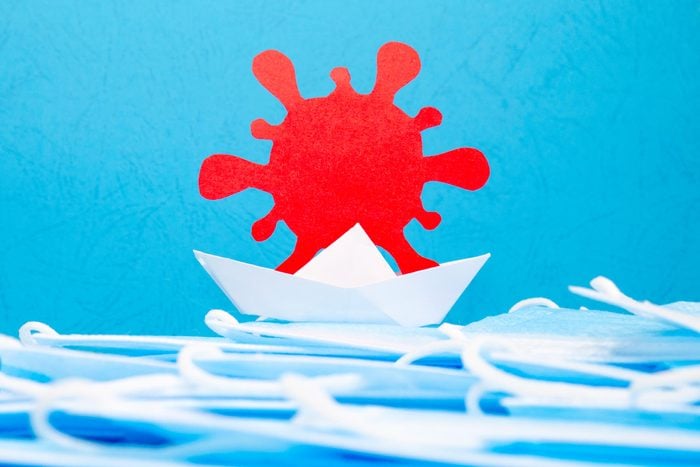
Everyone—including fellow passengers and crew—wants you to be healthy on your cruise. Here's how cruise ships prevent illnesses, and what happens if you do get sick or injured.
Our editors and experts handpick every product we feature. We may earn a commission from your purchases.
Whether you prefer family cruises or adults-only cruises, no one wants to get sick while they’re on vacation. This is especially true when you’re on a ship—after all, it’s tricky to cut your trip short if you’re floating in the middle of an ocean. Plus, falling ill on a cruise ship can have bigger implications these days. There are considerations related to cruise ships and COVID-19 that are designed to keep everyone aboard safe and healthy.
If you’re planning a trip on one of the best cruise lines or one of the most affordable ones, you need to know what to do if you feel under the weather on a cruise ship, whether it’s a little sea sickness or a more serious illness or injury. Consider this advice some of the essential cruise tips that all passengers should keep in mind before they board.
Get Reader’s Digest’s Read Up newsletter for more travel, cleaning, humor, tech and fun facts all week long.
Are there still pre-boarding health checks?
Yes. To protect you as well as your fellow passengers and the crew, cruise ship staff screens passengers for health issues prior to boarding. You’ll be asked to fill out a form that addresses health questions and illness symptoms like fever, vomiting and diarrhea. You may also have your temperature taken by walking through a thermal-imaging scanner. Checks for certification of COVID-19 vaccination or negative tests have, at least for now, ended (here are other recent changes that might affect your cruise). A staff member may ask you additional questions, and you might be sent for secondary screening by a doctor. Should they determine that your or anyone else’s health would be jeopardized, they may not let you board.
“It’s always important to answer any pre-boarding health questionnaires truthfully and to report any signs of illness to the ship’s crew as soon as symptoms arise,” says Cruise Critic’s editor-in-chief, Colleen McDaniel. Don’t worry—it doesn’t necessarily mean you won’t be allowed to board or you’ll wind up quarantined. Being honest not only affects your health and the health of everyone on the ship, but it could also affect the care you receive and any compensation either from the cruise line or your travel insurance if something goes wrong. We’ll give you more details about insurance below.
What kind of medical facilities are on a cruise ship?
Choosing a cruise line that’s a member of the Cruise Lines International Association (CLIA)—the largest trade association for the cruise industry—means you’ll know the ship meets or surpasses a minimum standard for health and safety. CLIA requires infirmaries to have an equipped examination room and a room for intensive care. Equipment is required to assess and monitor vital signs, administer medications and IV fluids and process some lab tests like checking blood sugar and electrolyte levels and diagnosing some infections. Other typical onboard equipment includes defibrillators, ventilators, cardiac monitors and stretchers. Some ships even have X-ray capabilities.
CLIA members must follow mandatory guidelines for their oceangoing ships, but many non-CLIA members have great medical facilities too. Check any cruise line’s website before you book. The number of medical staff on board depends on the size of the ship. Larger ships usually have more than one doctor, as well as a combination of paramedics and nurses. All crew, regardless of their jobs, need to be trained in safety and first aid too.
What happens if you get sick on a cruise ship?
The medical staff on cruise ships can diagnose and treat some illnesses on board and prescribe medications too. While cruise ships typically stock a broad range of meds, including antibiotics, there’s not always a large supply. Doctors may give you a prescription that you can fill at a pharmacy in the next port.
If medical staff are concerned about your condition, they may advise—and even require—you to seek the advice of specialists on shore, says William Spangler, MD, global medical director with AIG Travel. Port agents will often arrange a taxi or even an ambulance to the treatment center for you. In the best-case scenario, your appointment will be quick, your issue resolved or aided by the specialist, and you can hop back on board to your cruise cabin to heal while watching the scenery go by.
But that’s not always a guarantee. “It’s really up to the physician as to how comfortable they feel with keeping you aboard, versus disembarking you to make your way home or to a nearby facility where you can be definitively cared for,” says Dr. Spangler. Sometimes it’s the ship’s itinerary that poses the problem. For example, if the ship has a number of days at sea before it reaches the next port, the ship’s doctor and captain might be worried that you couldn’t get the help you need if your condition worsens and could deny you continuing with your cruise.
Here are some of the more common illnesses and how they are typically handled onboard.
If you get seasick
Though ships are equipped with stabilizers to maximize comfort, seasickness can happen to even those with the strongest of stomachs in rough waters. Many cruise ships offer seasickness medication to passengers—sometimes it’s free of charge and you can take pills from a basket outside the infirmary or at the purser’s desk. Medication is also available at the gift shop.
However, it’s wise to make a cruise packing list and travel with the medications or remedies that you know work for you, like Dramamine, Gravol or a motion sickness patch. Many people rely on sea sickness bracelets that activate a pressure point on the wrist. Ships’ doctors can prescribe stronger medications if needed.
If you have a cold or other mild illness
Before COVID-19, colds and other minor respiratory illnesses were not taken as seriously as they are now. If you have any respiratory symptoms on a cruise, you may be asked to take a COVID test—likely on multiple days and with swabs of both the mouth and nostrils—to rule it out. If COVID-19 is ruled out and the ship’s doctor thinks you likely do have just a cold, no one else on board wants to get a cold or other mild illness either. So be extra diligent about washing your hands often, and wear a KN/N95-type mask to keep your germs from spreading.
The ship’s medical center will likely give you the same advice as you would get at home—drink lots of (nonalcoholic) fluids and rest. If the doctor suspects your symptoms are caused by bacteria rather than a virus, they may prescribe an antibiotic.
If you have COVID-19
If you come down with COVID-19 while you’re on your cruise, you’ll likely be quarantined in your cabin. It’s important to prevent the spread, because it also affects the blood vessels, and one in 10 infections is causing long-term problems to the heart, circulatory system and brain. If you’re quarantined, says Dr. Spangler, “they bring you your meals and they check on you once or twice a day accompanied by one of the ship’s nurses.” There’s likely medication on board that will help ease some of your symptoms, but don’t assume that the ship (or the country you’re traveling in) will be able to provide antivirals like Paxlovid, even by prescription.
Dr. Spangler also notes that patients may be treated differently. He says a healthy, young person with COVID-19 would likely be quarantined in their cabin, but “if you’re 75 years old, with a condition like COPD, hypertension or diabetes, you will likely be disembarked.” Cruise ships rarely take chances with passengers that are very ill—or somewhat ill with the likelihood of getting worse.
Your key card will likely be deactivated while you’re under quarantine. If you disobey the doctor’s orders and leave your cabin anyway, you could be removed from the ship, and the cruise line may ban you from ever traveling with them again. Everything is “at the discretion of the ship’s doctor,” says Dr. Spangler, “and policies vary on different ships.” Some ships will quarantine you for five days, and others will while you’re showing symptoms, plus for another 72 hours beyond that to ensure you’re symptom-free. Often you’ll need to test negative on two antigen tests taken on subsequent days before your quarantine ends.
If you have norovirus
If you haven’t heard of this one before, it’s also known as viral gastroenteritis, which is highly contagious and presents with symptoms we commonly associate with food poisoning. It’s not the stomach flu, though many people use this term to describe it. The CDC estimates there are about 20 million cases of norovirus in the United States annually. It can occur anywhere, and because it is very contagious, it spreads particularly easily when people are in close quarters—like on an all-inclusive cruise. You might hear about norovirus on cruise ships, because cruise lines are required to track outbreaks of gastrointestinal disease, though hotels and restaurants are not.
As with COVID-19, you might be quarantined in your cabin if the ship’s doctor suspects you have a contagious disease like norovirus. The doctor may prescribe medications to prevent vomiting and diarrhea and give you advice to drink lots of fluids and rest as much as you can, but there is no treatment for norovirus, and it usually clears up after a few days.
When there are suspected cases of viral gastroenteritis onboard, many cruise ships change their operating procedures. This includes more frequent cleaning of high-touch items like door handles and railings, insisting that passengers sanitize their hands when entering dining rooms, and changing buffets so that it’s only staff who touch the serving utensils. You might want to pop on a KN95-type mask too, as there’s increasing evidence that norovirus is airborne.
If you have a medical emergency
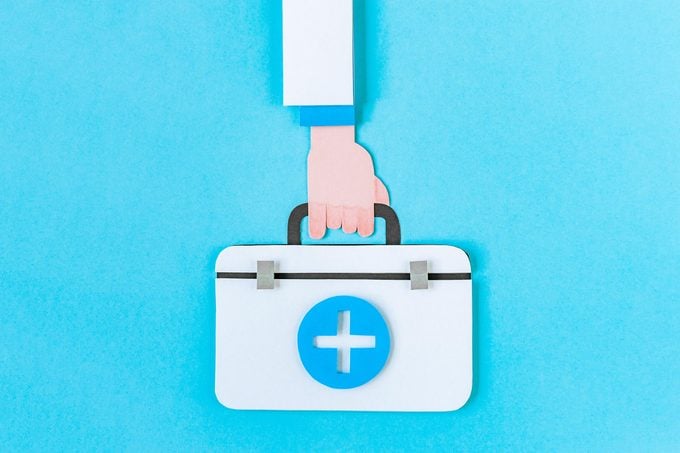
If you have a serious problem like a heart attack or a stroke or need surgery, the ship’s crew will do their best to treat and stabilize you until you can get to a facility at the nearest port that has the resources you need. Someone who has a heart attack or a stroke might be initially treated on board with a defibrillator or thrombolytic medications (which can help break up a blood clot). However, cruise ships’ infirmaries are not hospitals, and they are not equipped to treat every health problem. Should the ship’s doctor decide that you need care at an onshore hospital, they’ll keep you as safe and comfortable as possible until you get there.
Sometimes that means being transferred by boat or helicopter to shore, even diverting the ship from its planned itinerary to reach shore faster. When you’re too sick to be treated onboard, Dr. Spangler says, “the ship will disembark you at the next port, and it may not be anywhere near a major metropolis with highly rated medical facilities.” It’s a wise idea to have a travel insurance plan with robust medical evacuation coverage, since you must follow their orders if the ship’s doctor decides you must be medically disembarked.
What happens if you get hurt on a cruise ship?
Dr. Spangler says that really depends on the size of the cruise ship as well as the type of injury. A cut needing a few stitches can usually be addressed on board, as can minor burns. And for something like a minor fracture or a broken arm, “they might provide a splint and pain medication to get you through the end of the cruise,” says Dr. Spangler.
More serious bone breaks—like when the bone protrudes through the skin—will be handled differently, according to Dr. Spangler. “Obviously, with an open fracture, you’re going to be disembarked after first aid is administered.”
How much does it cost to see the doctor on a cruise ship?
Doctors on cruise ships are independent contractors and set their own rates. You can expect a basic visit to cost at least $100. Tests, medications and the use of equipment, like X-rays, will be charged separately.
If you do get sick or injured aboard a cruise ship, any medical costs will be added to your shipboard account. You’ll then need to submit receipts to your insurance company to determine what will be reimbursed.
Will your regular medical insurance cover these expenses?
Your everyday medical insurance is unlikely to cover any medical expenses aboard a cruise ship, even if that ship is in U.S. waters. That means it’s important to have good travel health insurance. It’s a small price to pay for peace of mind and, if you do get sick or injured, coverage of potentially hundreds of thousands of dollars of medical expenses.
Prior to your trip, check your existing insurance to see what it covers and determine any additional insurance you need to purchase. Both third parties and cruise lines offer insurance, but insurance purchased from the cruise line may not be as comprehensive, and reimbursement might be in the form of credit for a future cruise rather than a cash refund. Every insurance policy is different; it pays to read the fine print.
Your insurance may or may not cover a full or partial refund if, for example, you’re denied boarding, quarantined in your cabin or have to leave the cruise partway through. That depends both on the reason for not being able to continue with your cruise and the type of insurance you’ve purchased.
A good travel health insurance company can help you find the closest medical facility that’s best suited to treat your condition and, assuming it’s not nearby, help you get there, even if it requires expensive transportation. If your condition is very serious, many travel health insurance policies will help a family member get to you or arrange a medical evacuation for you to get home. If you had to pay for these services out of pocket, Dr. Spangler says the price tag could range “from $20,000 easily into the six figures.”
How can you stay healthy on a cruise?
Cruise lines’ crew work hard to keep everything clean to minimize the spread of communicable diseases, but it’s up to you to be cautious as well.
It may bring you peace of mind to know that many cruise lines updated their HVAC and ventilation systems in the first few years of the COVID pandemic. This helps with not just the spread of COVID-19, but also colds, flus and even gastrointestinal diseases. You can also hang out on the deck of your cruise ship rather than indoors whenever possible.
Washing your hands frequently is also important to prevent illnesses. Sanitizer is better than nothing, but washing with soap and water does a better job—though here are the ways you might be washing your hands wrong. Aboard many cruise ships, you’ll be asked to sanitize your hands when you enter the dining room. Washing your hands after you leave the restaurant or bar minimizes the spread of your germs too. That keeps everyone, including you, much safer.
Another stay-healthy tip is to try to touch fewer things. No one is suggesting not using the handrail on a staircase, but get in the habit of pushing the elevator button with your elbow and not putting your hands on the bar when you order a drink. And just FYI, if you’re sharing these things that germ experts wouldn’t share, you’re putting yourself at an increased risk of getting sick.
Whenever you travel, you should bring a first-aid kit packed with these essentials so you have key products on hand whenever you need them. For a cruise, add seasickness medication (whether in tablet form like Bonine and Dramamine, or motion sickness patches). Many people find that anti-nausea acupressure wristbands work for them.
Sources:
- Colleen McDaniel, editor-in-chief of Cruise Critic
- William Spangler, MD, global medical director with AIG Travel
- Cruise Lines International Association: “Public Health and Medical”
- Cruise Critic: “Cruise Ship Doctors and Medical Facilities Onboard
- British Heart Foundation: “Is coronavirus a disease of the blood vessels?”
- Infection Control Today: “CDC Offers Tips on Preventing the Spread of Norovirus”
- Centers for Disease Control: “Ventilation in Buildings”

